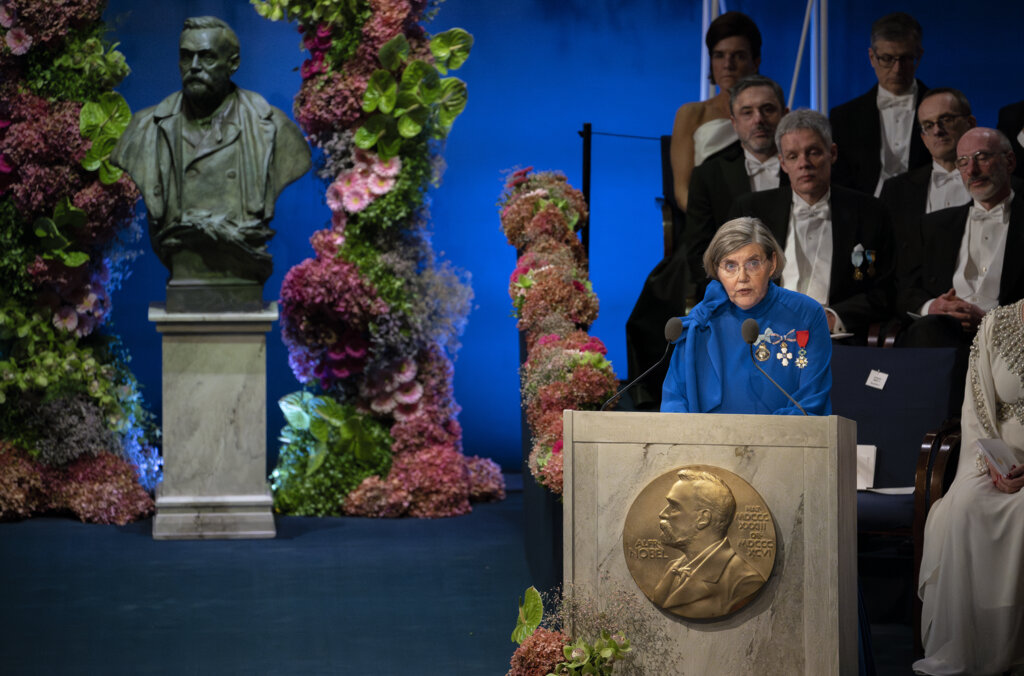
Speech by Professor Astrid Söderbergh Widding, Chair of the Board of the Nobel Foundation, 10 December 2024.
Your Majesties,
Your Royal Highnesses,
Esteemed Nobel Prize Laureates,
Excellencies,
Ladies and Gentlemen,
On behalf of the Nobel Foundation, it is my great honour and pleasure to welcome you all to the 2024 Nobel Prize award ceremony. In particular, I wish to welcome the Nobel Prize laureates, their families and friends.
Today in Oslo, the Nobel Peace Prize was awarded to Nihon Hidankyo, also known as Hibakusha, “for its efforts to achieve a world free of nuclear weapons and for demonstrating through witness testimony that nuclear weapons must never be used again”. This Japanese grassroot movement, survivors of the atomic bombs in Hiroshima and Nagasaki, has for almost 80 years argued the necessity of an international nuclear taboo. During decades, nuclear arms were considered the main threat to humankind, but in spite of these witnesses reminding us, and because of trust in arms treaties and international developments, this almost fell into oblivion. Today, as nuclear threats are being expressed anew in connection with wars and conflicts involving nuclear powers, the Nobel Peace Prize takes on an existential dimension. Earlier this year, a number of Nobel Prize laureates signed the Mainau declaration 2024 on nuclear weapons, urging all nations to protect human civilization by ensuring that nuclear arms never be used again. The atomic bomb also recalls that basic research put into practice is not only for good.
Still, however, it is through free, fundamental research that science must continue to explore and expand the frontiers of human knowledge, laying the foundation for future applications and development. The scientific breakthroughs awarded this year in science and medicine – the physics prize for using dynamical systems to understand mechanisms of memory and laying the foundations for artificial intelligence, the chemistry prize for using the latter for predicting protein structures, and for computational design of proteins, and the prize in physiology or medicine for the discovery of an essential complimentary process for how identical genetic information leads to different cells – have already led to groundbreaking applications for the greatest benefit of humankind. The unimaginable consequences that genetic technologies and artificial intelligence may perhaps introduce can only be managed in trustful, rule-based international collaboration.
The literature prize this year, awarded to a profound exploration of human vulnerability against the backdrop of historical trauma, where the abyss is always as close as is the longing for transformation, sheds light upon the fragile condition of humankind.
And finally, the prize in economic sciences, for quantitatively assessing the importance of a country’s institutions for its prosperity, can be considered in the present context of ongoing autocratisation, with faltering democracies.
Facing a number of interconnected challenges, including climate change and geopolitical tensions, we indeed live in times of volatility, uncertainty, complexity and ambiguity. The insightful testament of Alfred Nobel, which has gathered us here, is still of highest relevance. The scientific prizes award fundamental research. Still, all the awards, in their diversity, also address the global challenges of today. The laureates have paved the way. Science, literature and peace offer different paths to tackle today’s wicked problems. But they all remind us that it is not blind destiny that decides on our future as humanity. This also offers hope. It lies in our hands to change the world.